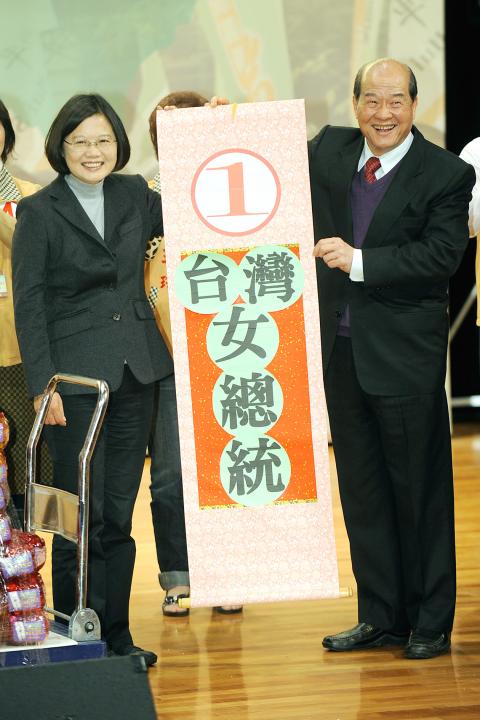Democratic Progressive Party (DPP) presidential candidate Tsai Ing-wen (蔡英文) yesterday received a boost as the Taiwan Solidarity Union (TSU) and a group of academics openly endorsed her bid.
In a speech at the TSU’s 10th anniversary celebration yesterday, Tsai said that during the DPP’s reforms over the past three years, the party has maintained close ties with the TSU and it has been a very enjoyable experience working with them.
Thanking the TSU for throwing its support behind her presidential campaign and the DPP’s legislative nominees, Tsai said she hoped the TSU would be able to pass the threshold required to earn a legislative seat and she looked forward to working with the TSU in the legislature.

Photo: Sean Chao, Taipei Times
Parties are required to receive 5 percent of the vote to nominate candidates for legislator-at-large seats.
Tsai said in her speech that the public was worried that a possible cross-strait peace accord mentioned by President Ma Ying-jeou (馬英九) would deprive the next generation of Taiwanese of a choice about their future, so the current generation should shoulder the responsibility.
“As such, the TSU and the DPP should work together even more closely and guard Taiwan,” she said.
On the nation’s economy, Tsai said the public needs an empathetic government that takes care of those who need help, not like the current government, which thought that every economic problem would be solved with the signing of the Economic Cooperation Framework Agreement (ECFA).
Former president Lee Teng-hui (李登輝), the TSU’s spiritual leader, did not attend the event as he is still recovering from surgery he underwent last month to have a tumor removed.
TSU Chairman Huang Kun-huei (黃昆輝) read a statement on Lee’s behalf, which called for voters to cast their ballots for Tsai for president, the DPP for legislators and the TSU for their party vote.
According to Huang, although the New Party and the People First Party split from the Chinese Nationalist Party (KMT), the current core mentality of KMT decisionmakers was the same “China Unification” path as the New Party, only with a different packaging to attract neutral voters.
“The KMT is using the New Party to make a show and make believe that the KMT is a party of a modest path,” he said.
At a separate setting yesterday, a group of academics, including several from Academia Sinica, formed an alliance in support of Tsai’s presidential bid.
Academia Sinica’s Lin Ming-chang (林明璋) served as honorary convener of the group, while Taiwan Association of University Professors president Chang Yen-hsien (張炎憲) served as the official convener.
Expressing her gratitude, Tsai said that being an Academia Sinica academic was once her dream.
“I am overcome with gratitude and a sense of responsibility today seeing so many academics and scholars show up to support my campaign, “ she said.
Translated by Jake Chung, Staff writer

AGING: As of last month, people aged 65 or older accounted for 20.06 percent of the total population and the number of couples who got married fell by 18,685 from 2024 Taiwan has surpassed South Korea as the country least willing to have children, with an annual crude birthrate of 4.62 per 1,000 people, Ministry of the Interior data showed yesterday. The nation was previously ranked the second-lowest country in terms of total fertility rate, or the average number of children a woman has in her lifetime. However, South Korea’s fertility rate began to recover from 2023, with total fertility rate rising from 0.72 and estimated to reach 0.82 to 0.85 by last year, and the crude birthrate projected at 6.7 per 1,000 people. Japan’s crude birthrate was projected to fall below six,

Conflict with Taiwan could leave China with “massive economic disruption, catastrophic military losses, significant social unrest, and devastating sanctions,” a US think tank said in a report released on Monday. The German Marshall Fund released a report titled If China Attacks Taiwan: The Consequences for China of “Minor Conflict” and “Major War” Scenarios. The report details the “massive” economic, military, social and international costs to China in the event of a minor conflict or major war with Taiwan, estimating that the Chinese People’s Liberation Army (PLA) could sustain losses of more than half of its active-duty ground forces, including 100,000 troops. Understanding Chinese

US President Donald Trump in an interview with the New York Times published on Thursday said that “it’s up to” Chinese President Xi Jinping (習近平) what China does on Taiwan, but that he would be “very unhappy” with a change in the “status quo.” “He [Xi] considers it to be a part of China, and that’s up to him what he’s going to be doing, but I’ve expressed to him that I would be very unhappy if he did that, and I don’t think he’ll do that. I hope he doesn’t do that,” Trump said. Trump made the comments in the context

SELF-DEFENSE: Tokyo has accelerated its spending goal and its defense minister said the nation needs to discuss whether it should develop nuclear-powered submarines China is ramping up objections to what it sees as Japan’s desire to acquire nuclear weapons, despite Tokyo’s longstanding renunciation of such arms, deepening another fissure in the two neighbors’ increasingly tense ties. In what appears to be a concerted effort, China’s foreign and defense ministries issued statements on Thursday condemning alleged remilitarism efforts by Tokyo. The remarks came as two of the country’s top think tanks jointly issued a 29-page report framing actions by “right-wing forces” in Japan as posing a “serious threat” to world peace. While that report did not define “right-wing forces,” the Chinese Ministry of Foreign Affairs was